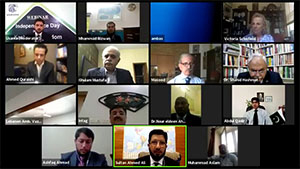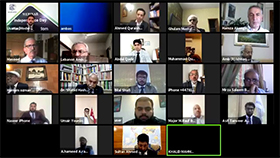Report of Webinar on Independence Day and Kashmir’s Freedom Struggle
| In connection with the independace day and plight of Kashmiris in Indian Occupied Jammu and Kashmir, MUSLIM Institute organized a Webinar. The webinar was chaired by Lt. Gen. Ghulam Mustafa (Retd), a renowned Geo-Political and Defence Analyst of Pakistan, while Mr. Sardar Masood Khan, President of Azad Jammu and Kashmir, was the Chief Guest. Sahibzada Sultan Ahmed Ali, the Chairman of MUSLIM Institute, delivered the opening remarks. Mr. Usama Bin Ashraf, Research Associate, MUSLIM Institute, moderated the proceedings. Diplomats, scholars, academics and policy makers also participated in the discussion. An interactive session was also organized following the end of the webinar. |
|
|
|
|
| » |
Sardar Masood Khan
President of Azad Jammu and Kashmir |
| » |
Air Marshal Masood Akhtar (Retd)
Defence Analyst |
| » |
Sahibzada Sultan Ahmed Ali
Chairman of MUSLIM Institute |
| » |
Lord Nazir Ahmed
President All-Party Parliamentary Groups on Kashmir, UK |
| » |
Maj. Gen. Shahid Ahmad Hashmat (Retd)
Former High Commissioner to Sri Lanka |
| » |
Ms. Victoria Schofield
British Author and Analyst |
| » |
Amb. Ishtiaq Hussain Andrabi (Retd)
Former Additional Secretary of Foreign Office |
| » |
Brig. Dr. Saif ur Rehman (Retd)
Director, India Study Centre, ISSI |
| » |
Ahmed Quraishi
Executive Director, YFK-International Kashmir Lobby Group |
|
|
A brief summary of the remarks shared by the panellists is observed as following:
14th of August marks a historical day when Muslims of the Indo-Pak subcontinent got independence and Pakistan came into being. The independence achieved 73 years ago was made possible by the sacrifices of the millions of people under the sterling leadership of Quaid-e-Azam Muhammad Ali Jinnah. Friends were sceptic and enemies plotted to frustrate the creation of Pakistan. Many thought that the state would collapse even if it came into being. All were proved wrong and Pakistan emerged on the map of the world like a rising star.
By the grace of Allah, today the state of Pakistan stands tall in the community of nations despite several cycles of turbulence, military attacks and attempts to undermine its sovereignty and territorial integrity. By acquiring credible strategic and conventional strategic capability, Pakistan has ensured its national security. Today, as Pakistan celebrates this day, it is moving towards the destination of holistic human development, economic progress and social cohesion. Pakistan has already made a transition from a frontier market to an emerging economy. The days are not far when Pakistan would be amongst the top economies of the world. |
|
|
|
|
|
|
When we see the situation of oppressed Muslims and other minorities in India, we realize the importance of Pakistan. The Indian Society is divided into four classes namely Brahmins, Kshatriyas, Vaishyas and Dalits. Whereas, Dalits are the most oppressed class. Muslims of India face oppression even worse than Dalits. A few people are shown as face-saving by different parties. That particular segment is among the privileged class and the rest of Muslims are living a miserable life. Similarly, Muslims’ historical sites and mosques are being demolished and temples are being built upon them. Muslim cultural heritage sites are under serious threat and are facing gradual elimination. Names of cities are being changed to eliminate Muslim identity.
Few nations in human history have paid so heavily far and so long to attain freedom, like the people of Indian Occupied Jammu & Kashmir (IOJ&K). The Muslims of IOJ&K whenever they found that their identity and their culture has been threatened, they have always raised their voice strongly. Their struggle against the Dogra rule was essential to attain and protect their socio-cultural and politico-economic rights. This wave of struggle was greatly influenced by the Pakistan Movement undergoing in British India. The Two Nation theory in India got further strengthened by the awareness of Kashmiri Muslims about their religious and cultural identity. Allama Iqbal’s Allahabad address in 1930, presenting the idea of a separate homeland for Muslims greatly influenced the establishment of the Muslim conference in Kashmir in 1932 which was the first political party of the Kashmiri Muslims. With this background, it was natural that the people of Kashmir in their struggle for freedom choose to conjoin their destiny with Pakistan. This was expressed through their representatives who met in Srinagar on 19 July 1947 and passed a resolution in favour of accession to Pakistan. |
|
|
|
|
| India could deploy one soldier for 9 Kashmiris but unfortunately just one ventilator for 70 thousand Kashmiris and one doctor for three thousand nine hundred persons, a ratio even lower than the Gaza. |
|
|
|
|
|
Indian Occupied Jammu & Kashmir has a long history of plight on the hands of Indian occupying forces but from the last one year, a new dark chapter has been inflicted upon Kashmiris in terms of severe human rights violations. In contrast to the United Nations Security Council’s resolutions, India took unilateral steps to merge IOJ&K. Civilians in the IOJ&K are being butchered and brutalized. India is now pursuing its vicious plans to alter the demography of IOJ&K by importing and flooding Hindus into the territory from all over India to turn a Muslim majority state into a Hindu state. The people of IOJ&K have vowed that they would block the onslaught of settler colonialist. The new domicile law has fueled anxiety among Kashmiris who were already facing restrictions imposed by Indian occupying forces. People are sieged under a curfew-like situation from more than one year and are deprived of basic necessities of life including internet and communication. In the wake of COVID-19 lock-down situations across the globe, the world can better understand the difficulties and miseries faced by Kashmiri people for a very long time. Many international actors are reluctant to support the principle stance of Kashmiris due to their economic interests in India.
There is a global shift and increasing trend in international media on the matter of IOJ&K especially after July 2016 following the extrajudicial execution of social activist Burhan Wani by the Indian Army. UN has broken the silence of the last fifty years and highlighted the agenda of IOJ&K in front of the international community. Similarly, Japan, despite being a close ally of India, has started highlighting the issue of IOJ&K and discussed the role of the Indian Army in IOJ&K. Those days had gone when India used to blame Pakistan for sponsoring freedom fighter’s movement in IOJ&K and cross border intrusions. The last major development is observed during an event held in France of G 7 countries and Indian Prime Minister was present in this event. At the end of the session Presidents of the USA and France discussed with Indian PM Modi on the matter of IOJ&K. This is a major shift at the international level that everyone is questioning the Indian Government upon what they are doing in Occupied Jammu & Kashmir publicly or privately. The role of Pakistani media in this respect is also very encouraging.
Pakistan should utilize all means which are at its dispense for the resolution of IOJ&K issue whether its third-party mediation, bilateralism or unilaterlaism. Through dialogue, at least, Pakistan can talk about human rights abuses and give statistics and can also highlight thousands of deaths since the early 1990s. Civil society in both countries and throughout the world can play a key role. Civil society is the main driver of a democratic state who can show concerns on IOJ&K issue leading towards possible solution. Without these movements one has a situation, where both India and Pakistan and the region at large are caught in a ‘demographic time bomb’.
It is our national and global responsibility to stop the Indian crimes against humanity in IOJ&K. Human rights abuses do not affect a few people, they do affect the whole world. We should resolve to continue and accelerate our relevant struggle until Kashmiris get their freedom and self-determination. Panellists further emphasised to make the Kashmiri struggle an international movement with the support of the international media and civil society. There is a need of a threshold pitch and threshold mass to liberate the people of IOJ&K. Pakistan’s freedom is incomplete without the freedom of IOJ&K. |
|
|
|
|
| |
 |
| Screenshot of webinar's participants |
|
| |
 |
| Screenshot of webinar's participants |
|
|
|
|
|
|
| |
| Based on discussion and speeches of speakers, the following recommendations have been derived: |
| » |
Government of Pakistan should mobilise its diplomatic channels to convince United Nations Security Council in exercising its power given under Article 13(b) of Rome Statute of International Criminal Court for prosecuting Genocide, War Crimes, and Act of Aggression in Indian Occupied Jammu & Kashmir against India. |
| » |
United Nations, its specialized agencies and affiliated organizations, OIC, European Union and other key International Organizations should take concrete steps to stop the brutal and extrajudicial killings of innocent civilians, to lift the curfew in IOJ&K and for permanent solution of IOJ&K dispute. |
| » |
International Community should be convinced through an organized campaign by the Government of Pakistan to highlight ‘demographic time Bomb of IOJ&K’ and raise voice against the brutal killings of civilian and double lockdown in IOJ&K. |
| » |
Government of Pakistan may consider appointing a deputy foreign minister, under the foreign minister, dedicated to the cause of IOJ&K. The deputy foreign minister may be supported by a special cell in ministry of foreign affairs headed by special secretary and assited by a team of seasoned officers. |
| » |
Government of Pakistan should ask the UN for appointing special envoy for IOJ&K irrespective of Indian willingness and this must be done so that human rights violations in Indian Occupied Jammu & Kashmir could be observed. |
| » |
India has always tried to avoid dialogue with Pakistan.Therefore, along with unilateral steps, Pakistan should continue its multilateral efforts at various international forums for the just resolution of IOJ&K issue. |
| » |
International media should bring IOJ&K issue in the spotlight and also highlight the Indian atrocities committed in IOJ&K and present the true picture of the freedom movement of IOJ&K. |
| |
|
|
|
|
|
Download pdf
Newsletter
Share